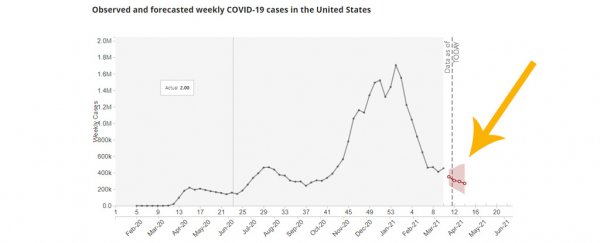Plateauing COVID-19 case rates, and the discovery of coronavirus variants in several states, could mean an "avoidable" fourth surge in COVID-19 cases is on the way in the US, the director of the Centers for Disease Control and Prevention said Monday.
Dr. Rochelle Walensky said the US was at a "fork in the road" in the pandemic, as more people get vaccinated.
She noted several indicators pointed to a concerning trend, including:
- The number of new COVID-19 cases reported each day is hovering at a high level of 50,000 to 60,000.
- New hospital admissions have also plateaued at 4,500 to 5,000 admissions a day.
- Deaths from COVID-19 are declining but remain high, and the rate of decline is slowing.
- Some states and regions, such as the Northeast and the upper Midwest, are seeing "a significant rise in cases," Walensky said.
- Coronavirus variants are "spreading rapidly," she said. The B.1.427 and B.1.429 variant, first identified in California, accounts for 52 percent of cases in California, 41 percent in Nevada, and 25 percent in Arizona, Walensky said.
- The B.1.1.7 variant, first identified in the UK, is estimated to be causing 9 percent of cases in New Jersey and 8 percent in Florida, she said.
"Taken together, these statistics should serve as a warning sign for the American people," Walensky said.
Referring to the leveling of COVID-19 cases and hospital admissions seen in the past two weeks, she said she considered them "very concerning".
She said there would be "another avoidable surge" without immediate action.
Experts have said the rise in cases is most likely due to the "tension" between the desire to open up the country and the risk associated with variants, as STAT reported Saturday.
According to John Hopkins University data, as of Sunday more than half of US states had experienced a growth in new cases in the past two weeks, while 24 states saw a decrease.
The US could be going the way of Europe, she said, where cases are surging after having plateaued, led by the B.1.1.7 variant.
Walensky's warning comes as the US ramps up its vaccination rollout.
Some 24.9 percent of the US population have received at least one dose of a COVID-19 vaccine, while 13.5 percent were fully vaccinated as of Monday, according to CDC data.
President Joe Biden has said all US adults should be eligible for a COVID-19 vaccine by May 1, and some states are expected to start vaccinating all adults by April, Insider's Aria Bendix reported earlier this month.
But experts warn that while vaccination rates rise, the virus can continue to circulate.
Uncontrolled spread of the virus "increases the risk that an even more dangerous variant may emerge," Dr. Tom Frieden, a former CDC director, told CNN on Monday.
The B.1.1.7 variant is of particular concern, as it has been estimated that people infected with this strain are up to 64 percent more likely to die from COVID-19, Insider's Aylin Woodward reported.
"I'm calling the American people to action, whether they're vaccinated or not, to recommit to doing the right thing," Walensky said on Monday.
"Take the steps we know work to stop COVID-19. Wear a well-fitting mask, socially distance, avoid crowds and travel, and be ready to roll up your sleeve to get vaccinated when the vaccine is available to you."
This article was originally published by Business Insider.
More from Business Insider:
